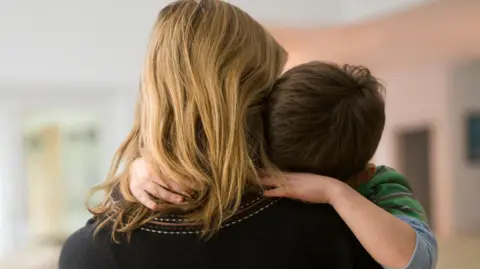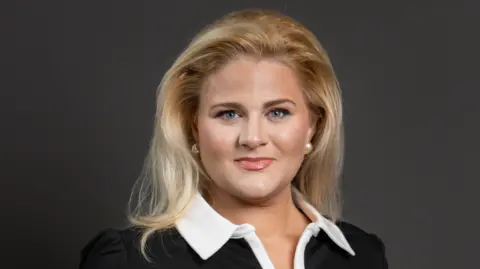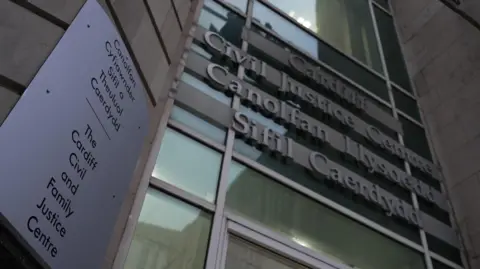Shorter family court hearings 'encouraging', says minister
 Getty Images
Getty ImagesParents and children experiencing shorter family court hearings following a government review is "encouraging", a minister has said.
The Ministry of Justice (MoJ) said a pilot scheme in some courts, intended to reduce delays and better support victims of domestic abuse, had reduced the duration of cases from an average of 29 weeks to 18.
Alex Davies-Jones MP, a minister for violence against women and girls, said the scheme had helped with the family courts' understanding of domestic abuse.
But some parents who have experienced the family courts under the pilot scheme have raised concerns about the process.
When parents have separated and cannot agree on how to share their caring responsibilities, they turn to the family court.
The judge can decide on issues such as who the children will live with, how their holidays are organised, as well as where they will go to school.
Family courts also carry out care proceedings when a local authority is concerned that a child is at risk of harm.
There are about 46,000 private family law cases heard in England and Wales each year.
A pilot scheme called 'Pathfinder' was launched in some family court proceedings in 2022, after a review of the family justice system highlighted examples of child arrangements being unsafe and allegations of abuse being ignored or disbelieved.
Davies-Jones said Pathfinder had "definitely helped in the family courts' understanding of domestic abuse".
"I think for far too long sadly [domestic abuse] wasn't really being taken into consideration, and not just by the family courts, by government and society as a whole," she added.
 Alexandra Davies-Jones ©House of Commons
Alexandra Davies-Jones ©House of CommonsNorth Wales and Dorset were the first pilot areas, with it later being expanded to all of Wales, Birmingham and West Yorkshire.
The first evaluation of the pilot areas, based on interviews with 67 frontline professionals in the court system, found that less time in court was a benefit for families and the court system, and that the child's voice being centred in proceedings was recognised.
However, resourcing and staffing was found to be a challenge.
Davies-Jones said the evaluation was "really key in showing us what is working, what needs to be tweaked, what needs to be improved".
Domestic Abuse Commissioner Dame Nicole Jacobs said the evaluation provided "clear evidence that government should roll this approach out fully across all family courts in England and Wales".
'The process was still difficult'
Journalists can request to report from family courts after new transparency rules were announced last year, provided they keep the details anonymous.
BBC News followed a case at Cardiff Family Court where domestic abuse allegations were made by the mother and highlighted in the initial child impact report.
Identifying these claims early in the process is a key feature of Pathfinder.
The report made recommendations about contact if the abuse allegations were found to be true.
The judge ruled there had been coercive control, physical and emotional abuse.
The mother told the BBC: "The court acknowledged the abuse, and I appreciated the separate entrances and witness protection suite.
"But abuse isn't always obvious, it can come through in the smallest ways, and it's hard to paint the full picture in a courtroom."
She said there was support but that it did not help with the emotional toll, adding that she found the process "exhausting".
After multiple hearings, the father sought the court's permission to withdraw his application for child arrangements .
The judge, who read an email from the father, told the court: "Proceedings had been distressing and [the father] doesn't feel he can engage or is in a financial position to continue with representation."
The judge ruled the child would live with the mother and have no contact from the father.
He said this would provide an extra layer of protection to the mother, that the father would need to complete a perpetrator programme before returning to court proceedings, if he wanted to bring them in the future.

Another parent who had a case under the Pathfinder pilot was critical of the process.
They said abuse was not identified and the case dragged on for years.
BBC News did not follow this case in court and for legal reasons is unable to view and verify the court documents.
The person said: "Domestic abuse was raised but dismissed as mere conflict, without properly assessing coercive control.
"I feel it has treated me as badly if not worse than my abusive ex-partner."
Davies-Jones said these experiences were "really hard to hear" adding that she was "sorry" to anyone who had had that experience.
"Overwhelmingly the experiences that we've had has been positive, but if that's one person's view then that needs to be taken into consideration. That's why we're evaluating it now to see where people haven't had that good experience, where can we do better but how we can do better."
Davies-Jones said people should know that "we hear you, we're listening and we're trying to do better".
Minister for Family Courts, Lord Ponsonby said Pathfinder would continue to be rolled out across the country.
"Frontline staff are reporting that survivors feel safer, and children are better prioritised and protected, which is exactly what we're hoping to achieve across the country," Lord Ponsonby added.
